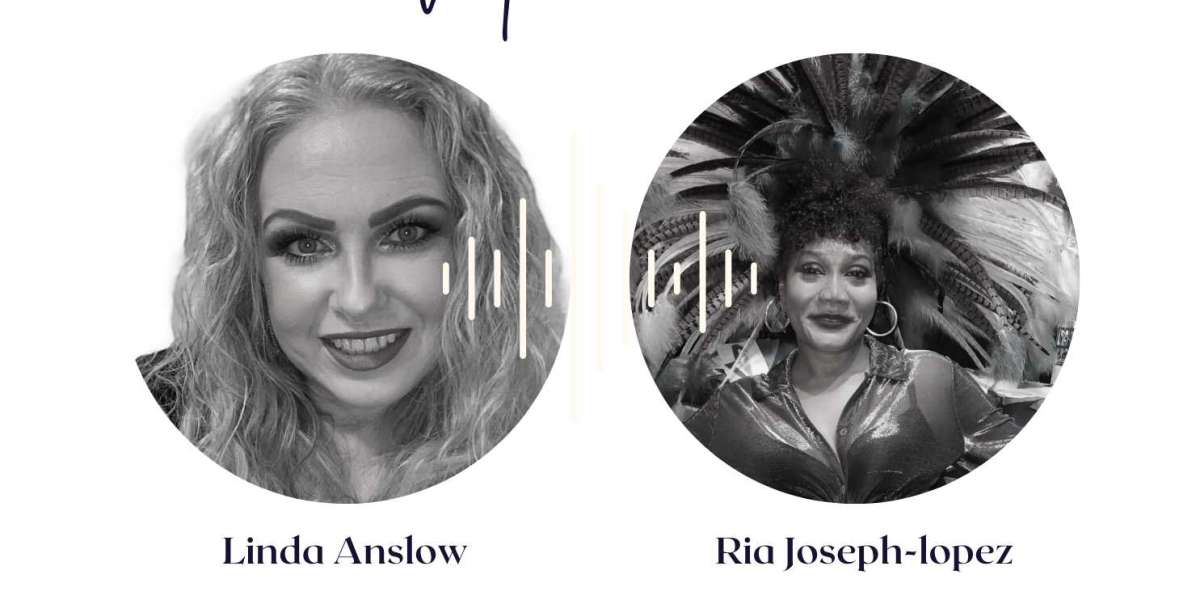Join us for an empowering discussion as Ria Joseph-Lopez, CEO of Grey Matter T and T Limited, and Linda, a dedicated yoga teacher and holistic therapist, explore the transformative power of networking.
Ria's extensive experience in the financial services industry and her role as Country Head for Moms In Business International highlight the importance of networking in fostering growth and development for female entrepreneurs globally. Additionally, her involvement with Hopefull Handbags Charity Trinidad and Tobago underscores the impact of community support in addressing critical social issues.
Linda's holistic approach to wellness emphasizes the interconnectedness of mind, body, and spirit, offering valuable insights into the role of networking in personal and professional growth.
Together, Ria and Linda share their perspectives, experiences, and practical tips for leveraging networking opportunities to propel oneself forward. They discuss the value of building genuine connections, fostering relationships, and seeking out supportive communities.
Tune in as they inspire listeners to harness the power of networking to expand their horizons, seize opportunities, and achieve their goals. Whether you're an entrepreneur, professional, or individual seeking personal growth, this episode offers guidance and encouragement to navigate the networking landscape with confidence and purpose.
Sponsored by Liquid Lipo Ltd Meet the founder Kiki is an International Awarding Winning Product Developer bringing a range of incredible products to the market, including ZX10,
Liquid Lipo, Blepharonat, and many more. Her product range has been used to train over 1,000 people globally, with over 20,000 case studies showing amazing results in fat loss, pain management, and anti-aging.
Kiki is an Inspirational Speaker using her own life experiences and health issues to become a driving force to bring faster-acting solutions with more robust results to the market.
https://www.liquidlipointernational.com
Welcome to the Marketing Mindset and Motherhood podcast, where we explore marketing strategies, personal growth, and the challenges of being a mom in business.
I'm Leona Burton, your host, excited to share this journey with you.
This podcast is proudly sponsored by LiquidLypo.
Join us as we delve into marketing, nurture a resilient mindset, and navigate the balancing act of motherhood.
Grab a coffee, find a quiet corner, and get ready for inspiration.
It's time to unlock your marketing potential.
I'm Linda Anslow, and I'll be your host today.
In today's episode, we'll discuss networking for success.
Joining me is Rhea Joseph Lopez.
Hi, Rhea. Thank you for having me.
Hi, Linda. Thank you for having me.
I'm Rhea, the networking leader for Trinidad and Tobago.
Apart from networking, I run Grey Matter TNT Limited, offering corporate training and holistic development.
I'm also involved with the Judo Academy of Trinidad and Tobago and authored "The Unapologetic Survivor."
I'm a mom, a wife.
I have my own business. It's called Grey Matter TNT Limited, where I train persons in the corporate world, as well as individuals in non-technical training, or what we call soft skills, such as customer service, such as sensitivity training, for example, in the corporate world.
In terms of other things that I do, I'm also part of an NGO called Judo Academy of Trinidad and Tobago, where we use Judo as a tool to support young persons in growing their confidence, their self-esteem, and self-discipline.
I'm also an author. I wrote a book recently called "The Unapologetic Survivor" for persons who have survived. I myself am a cancer survivor. So for persons who have survived anything, you name it, it's a book of 30 poems for heroes, for overcomers, for persons who have survived.
That's amazing. You're doing a lot over there, and it's really lovely to hear about it.
So I'm going to ask you a couple of questions.
So the first one, I wonder if you could give us some tips and hints and tell us how you make meaningful connections when you're networking in your field.
One of the things that I always do in terms of making meaningful connections is about learning about the person, learning about who the other person genuinely is, what is important to them, connect with them on a real person-to-person level, not just professional.
Yes, we would hear about the other person's qualifications, what they're good at in the world of work, for example.
But what's important to me in terms of making meaningful connections is learning about who this person is, what's important to them, what makes them tick.
How can I support you to be the best you that you can be?
How can I, picking up the phone and just making a random call, hey Linda, how are you doing today? What is going well? What is new? What is good? How can I help? What is the thing I can do to reach out, to make a difference in your life and what it is, what you do and what's important to you?
I think that's really important, isn't it? The sense of community and the sense of how you make another person feel.
There's that well-known saying, isn't there, people remember how you make them feel. And, you know, that's very, very important.
And I think you've made a really, really good point there.
So what's your go-to for leaving a good first impression in professional settings?
My go-to in terms of leaving a good impression in terms of professional settings would be how you present yourself.
Presenting yourself in terms of a professional outlook.
So whatever your line of work is, your profession, present yourself accordingly.
And in terms of ensuring that the first impression of how you come into that room last, that is a positive first impression when you walk into a room.
Ensure that, for example, in my line of work, it's about training, development, corporate education, that kind of thing.
So how I walk into that room in terms of presenting myself and making that first impression will make it last and make it count.
Yeah, I think a smile is always a good start, isn't it? As you walk into that room, that warm smile and a warm smile adds so much value to any outfit.
Definitely. It's a smile for me and how I hold myself from walking in and being approachable, I think, as well, do you?
Definitely.
Being approachable is so important.
Understanding that no matter where you are, what you're doing, how you're doing it, people must be able to say, hey, I can go to Ria, I can go to Linda to get more information, to learn more about this thing, whatever it is I'm presenting, be it information on MIB, be it information on my own business, be it information about the NGO work that I'm doing.
How can I go up to Linda? Can I go up to Ria to learn more and to feel included, that sense of feeling of inclusivity that we can allow when we walk into a room?
Yeah. It makes all the difference.
Have you any tips on keeping and growing professional relationships?
Yes.
What's important, as I mentioned when I opened, it's reaching out, keeping that sense of continuous communication going.
What I've done for my wonderful ladies in Trinidad and Tobago is set up a WhatsApp group.
In that WhatsApp group, we share information about birthdays, we share information about milestones, what's new, what's good, what's going well.
How can I help?
Even in, for example, I had one of my ladies about two weeks ago, her dad passed away.
Being able to be a support system as well for each other.
That's how we grew in Trinidad and Tobago, being able to support each other, as I mentioned, in meaningful and real ways.
Because the relationship is, the business relationship comes second to that personal relationship.
Someone must like you as a person before they can seek to do business with you.
That's how I see it.
Yeah.
Sometimes it's quite lonely, isn't it, being self-employed and having a business?
Definitely.
I think the community, the networking community is a really good source of drawing strength from that and that sense of companionship.
Yes, I'm glad you mentioned that, Linda.
That's such an amazing point in this whole conversation that we're having, that that whole entrepreneurship journey is a very lonely one.
It can get very, very lonely.
What helps is building that community around us and being part of that community for others as well.
Yeah, I think we can draw strength from each other and knowing that everybody's faced the same struggles, everybody has a bad day and a really good day, and we can really help each other out there.
Definitely.
Definitely.
So I agree.
So why do you've already mentioned about listening to people and stuff, but why do you think listening is so important in networking and how do you practice
what we can do when we get together, what we can when we start to talk, how things can
move, the changes we can make in our communities, the changes we could make in each other's
lives.
Yeah.
It's so powerful.
We are so powerful as women.
We are.
We are.
I totally agree.
So where do you recommend connecting online for professional purposes?
How do you find your connections online?
It would be Facebook reaching out in different Facebook groups.
Social media is a very, very awesome tool, powerful tool, far-reaching, as we all know.
So Facebook is great.
I'm also on LinkedIn.
Yeah.
Instagram, as well as local, different local groups that I may participate in, may be invited
to and get involved.
I'm advocating get involved in for women to get involved in their community groups and
make your presence felt there.
So it's both online and in person as well.
Yeah.
Yeah.
Do you tend to connect with ladies in groups, comment, and then take the conversation into
Messenger or?
What I would do, I leave it open.
If sometimes a woman, a lady might say, oh, I want to reach out to you.
I want to send you a private message.
Let's continue this conversation elsewhere.
And then we take it there.
But what I try to do is start conversations openly on Facebook, on Instagram, on LinkedIn,
and just get different, different comments coming in and different bits of feedback.
Brilliant.
Thank you very much.
So how do you find a balance between quantity and quality in networking?
That is a question that in the early stages posed a little bit of a challenge.
I think what I've realized is that somehow it sifts out itself when the conversation
starts to go in the direction that it should be going in.
Quality stays.
Yeah.
Quality stays.
Quantity stays.
The fluff tends to dissipate.
But when the conversation is going in the direction that it should be going in, quality
stays.
Quality hangs around.
Yeah.
Yeah.
Stays and stays and stays for longevity.
But quantity doesn't.
No, no.
So have you found that you've tried different networking groups and things and that you
tend to choose now the ones that you find that quality in and those connections?
Oh, definitely.
There are, there are.
For a while when you start, when I mixed mingled, went, was invited to this group or that group,
both online and in person, Linda.
What I found is that I was able to, as I said, that sifting process is important.
And I was able to sift out what makes sense for the mission of MIB, my personal business,
my personal life goals and ambitions.
And I was able to sift that out.
It was, clarity came.
But it takes, it's a process in itself.
It's not something that when we start networking that you just come upon.
But it's a process, a learning, it's a learning curve in itself.
Yeah.
That doesn't, that doesn't just happen just like that.
But when the epiphany comes, it comes.
But that's after some experience of getting as a, as a, as a networker, being an experienced
woman in doing this whole networking thing.
Yeah.
Yeah, definitely.
Definitely.
So have you got any advice on using informational interviews to build your network?
Information, yes.
Basically, when we speak to informational interviews, we speak to basically getting
information from persons.
And when we, this is how I interpret that question, Linda.
So for example, if I need to get some skill or some product in my business, what I would
do, I would seek information by interviewing some source.
So basically, so basically in my personal business, Grey Matter TNT Limited, I may need
a poor trainer, for example, or someone who's skilled in a particular area that I may not
be skilled in, in order to deliver a bit of training to some corporate entity.
And what I would do, I would interview that person based on some of the recruitment notices
that I may have sent out.
Yeah.
So it's a very important tool.
And I think within MIB as well, you can guarantee that you'll be able to find somebody who's
got the skill that you're looking for, wouldn't you, and be able to speak to them as well.
I find that a really, really good resource.
Oh, yes, definitely.
Definitely.
So we've talked about how you are an experienced networker now.
You're a group leader.
You've been networking for a few years.
So what tips do you have for the introverted people who might want to start networking?
So the people who are shy, the people who don't like speaking about themselves, the
people who probably sit at the back and be worried when it came for their time to speak,
what advice have you got for those?
Oh,
boy.
One of the things that I tend to share is that it's always a learning curve.
And I'm not saying that introverted individuals, shy individuals, cannot network.
I'm not saying that.
It's all about a learning curve.
And I say it's like a bicycle.
When you're learning to ride a bicycle, you tend to fall a few times.
But after a few falls, you realize, okay, I have to balance.
And after a while, you are able to ride without hands.
You're able to do stunts.
You're able to do all sorts of things.
But it takes practice.
So I'm saying to the introverted individuals, to the shy individuals, don't feel daunted.
It's a process.
It's a learning curve.
It's all about learning.
And you know what?
Sometimes you might feel a bit afraid to speak.
But sometimes, when you're in that room, there might be somebody else feeling exactly
the way you're feeling.
So just a smile or just a hello or just a hi or just a conversation starter, just that
openness, that welcoming spirit might make a difference to somebody else in that room.
So I say to introverted individuals, just take your time.
Just take your time.
There's no rush.
And you'll find that as you do it more and more, you become more and more comfortable.
You become more and more comfortable.
You become more and more comfortable.
So just take your time.
That's all I would say.
Absolutely, continuing from where we left off:
That's all I would say.
It's like riding a bicycle.
It's like, you know, just getting into a car and learning how to drive.
At first, it might seem daunting.
But with practice, with time, with experience, you get better and better.
And before you know it, you're a pro at it.
So take your time.
There's no rush.
And always remember, there's always someone else in that room who might be feeling the
exact same way you are.
So just a simple smile, a simple hello, a simple conversation starter can make all the
difference in breaking the ice and starting to build those connections.
Absolutely.
Absolutely.
So do you find that, like, when you're doing your networking and you're, you know, you're
getting to know people, that you're also looking to see how you can help them?
Absolutely.
Absolutely.
It's all about what can I do for you?
How can I assist you?
And it's so funny because when you go into a room, everybody's looking for something.
Everybody's looking for an opportunity.
Everybody's looking for, you know, something that they can benefit from.
But if you go into that room with the mindset of, "How can I help you?
How can I be of service to you?"
It changes the entire dynamic of the conversation.
And people are more open.
People are more receptive because they're like, "Wow, this person is not just here to
take, take, take.
They're here to give as well."
And that reciprocity builds a stronger bond, a stronger connection.
And it's not just about, "What can you do for me?"
It's about, "How can we support each other?
How can we lift each other up?"
And that's what networking is all about, building those mutually beneficial relationships.
Absolutely.
Absolutely.
So I'm interested.
What advice do you have for, you know, more seasoned networkers, people who have been doing
this for a while but maybe feel like they're in a bit of a rut?
What advice do you have for them to, you know, shake things up and revitalize their networking
efforts?
Oh, that's a great question.
Because, you know, sometimes we get comfortable.
We get into our routines.
We go to the same events.
We talk to the same people.
And it's important to shake things up every now and then.
So my advice would be to step out of your comfort zone.
Try new networking events.
Go to different groups.
Attend conferences or seminars that you wouldn't normally go to.
Because you never know where you're going to meet your next big connection or your next
big opportunity.
So stepping out of that comfort zone, trying new things, and also maybe revisiting your
network.
You know, reaching out to people that you haven't spoken to in a while, reconnecting with
old contacts, because sometimes those old connections can lead to new opportunities as
well.
So just shaking things up, trying new things, and always staying open to new opportunities
and new connections.
Absolutely.
Absolutely.
So we've talked a lot about networking and the importance of it.
But I'm curious, how do you balance networking with your other professional and personal
responsibilities?
That's a great question, Linda.
And it's something that I think a lot of people struggle with, finding that balance.
But for me, it's all about prioritizing.
It's all about knowing what's important to me, what are my goals, both personally and professionally,
and then making sure that I allocate my time accordingly.
So, you know, there are times when networking might take precedence because I know that
building those relationships is important for the growth of my business or for my personal
development.
But then there are other times when I need to focus more on my family or on my other professional
responsibilities.
So it's really about being intentional with your time, setting boundaries when necessary,
and making sure that you're not spreading yourself too thin.
Because I think that's where a lot of people run into trouble, is they try to do everything
and be everywhere, and then they end up not really being present in any one area.
So it's really about finding that balance and being intentional with your time and your
energy.
Absolutely.
Absolutely.
So do you have any final thoughts or tips that you want to share with our audience about
networking and building connections?
Absolutely.
I think the key thing to remember is that networking is not just about exchanging business
cards or collecting LinkedIn connections.
It's about building genuine, authentic relationships with people.
And the more you can approach networking from a place of service, of how can I help you,
how can I be of value to you, the more successful you'll be in building those relationships.
So always approach networking with an open mind and an open heart, and be genuine in your
intentions.
And I think if you do that, you'll find that you'll not only build a strong network, but
you'll also find a lot of fulfillment and satisfaction in the connections that you make.
Absolutely.
Absolutely.
Well, thank you so much for joining us today, [Name].
It's been an absolute pleasure speaking with you, Linda.
And thank you for having me.
It's been a great conversation.
Thank you.
Thank you.








